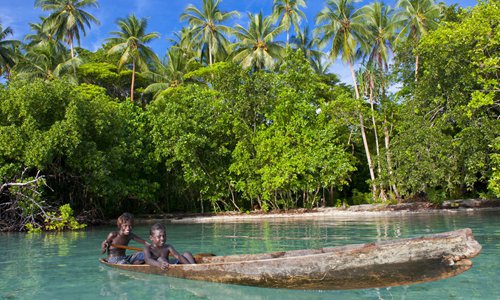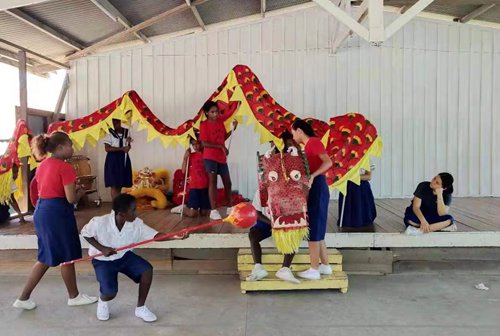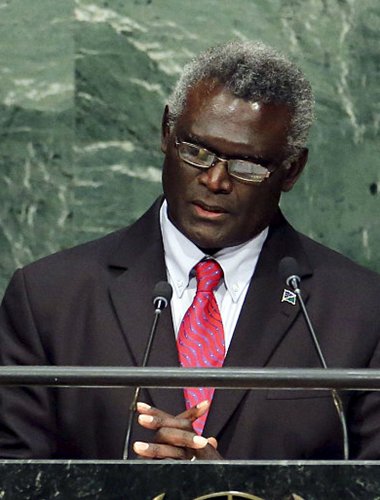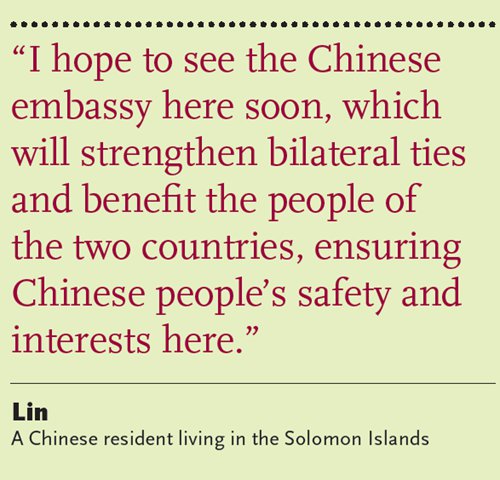HOME >> CHINA
Chinese people in Solomon Islands welcome new diplomatic ties
By Shan Jie and Liu Xin Source:Global Times Published: 2019/9/17 18:23:40 Last Updated: 2019/9/18 1:07:44
○ Chinese people have been living and working in the Solomon Islands for many decades
○ The Chung Wah School, which features Chinese language teaching, is one of the top schools in the country
○ Chinese private and state-owned companies are also operating in the island country, and contributing to its development

Zheng Yangxu's students in Solomon Islands can sing several Chinese songs - Jasmine Flower, The Moon Represents my Heart and Fireflies Fly.
The 26-year-old teacher of music is from East China's Shandong Province, and has been a volunteer teacher at the Chung Wah School in the Solomon Islands for two years.
Chung Wah means "China." The school was founded 70 years ago by the Chinese community in the Solomon Islands.
Now a top school in Honiara, capital of the island country, the school has hundreds of students. Even though most of them are not of Chinese origin, they still learn Chinese language as a tradition of the school.
Chinese people have been living and working in the Solomon Islands for many decades, making great contributions to the country's development in many aspects.
There are currently thousands of Chinese people in the country, according to data from the China Center for Economic Research.
Both private companies and state-owned companies from China are operating there.
However, for many years, Chinese citizens in the island country could not enjoy the convenience provided by a Chinese embassy.
On Monday, the Solomon Islands congress decided to recognize the one-China principle, cutting its 36-year-long "diplomatic ties" with the island of Taiwan.
The Chinese Ministry of Foreign Affairs applauded the decision in a statement released late Monday night.
The decision of the Solomon Islands government to recognize the one-China principle and establish diplomatic ties with the Chinese mainland again fully testifies to the fact that the one-China principle meets the shared aspiration of the people and constitutes an irresistible trend of the times, read the statement.
The news was also warmly welcomed by Chinese people in the Solomon Islands, who expressed their excitement on social media platforms.
"Everybody is posting about the news," Zheng said. "We hope to see communication and cooperation between the Chinese and Solomon governments soon."
"Taiwan is doomed to have 'diplomatic ties' with the Solomon Islands cut. We hope the Chinese mainland and the Solomon Islands could develop together in a bright way," a Chinese resident in the Solomon Islands wrote in his WeChat account on Tuesday.
"We Chinese people abroad felt proud," a Chinese resident surnamed Lin told the Global Times on Tuesday. "I hope to see the Chinese embassy here soon, which will strengthen bilateral ties and benefit the people of the two countries, ensuring Chinese people's safety and interests here."

The history of Chinese people living in the Solomon Islands can be traced back to the 1940s, when two families from Chikan town in Kaiping, South China's Guangdong Province, sailed to the island country and settled down there, according to Chinese economic media outlet Yicai.
They were the first of many Kaiping people who would migrate to the Solomon Islands. They remain the biggest group of Chinese people there.
People in Kaiping have a tradition of migrating and doing business overseas. The mid-1990s and early 2000s saw two great waves of Kaiping residents moving to the Solomon Islands.
By 2006, about 60 percent of Chinese people in the Solomon Islands were from Kaiping, according to a Yicai report in 2006.
In 2006, a riot broke out in the Solomon Islands, affecting Chinese people living there. Some rioters smashed and looted shops run by Chinese people.
The Chinese government then brought hundreds of Chinese people from the island country to nearby Papua New Guinea and then back to China. Some of the people had Solomon Islands citizenship, according to the Xinhua News Agency.
In recent years, more people from other parts of China have moved to the Solomon Islands to do business.
At least 70 percent of shops in the capital Honiara are run by Chinese, according to Li Lin, an employee at a mining company there.
A Chinese resident surnamed Wang from Jinhua, East China's Zhejiang Province, came to the Solomon Islands three months ago. It took Wang and her husband about 30 hours to fly to the island country via transferring at Singapore and Papua New Guinea.
Wang now manages local employees at a Chinese company that sells daily necessities. She told the Global Times that their goods come from China, Italy and Thailand. She believed Chinese goods have changed local people's lives in the Solomon Islands.
"Prices of housing and land are extremely high here," she said.
Wang said she and her husband could make about 200,000 yuan ($28,000) a year together on the Solomon Islands, more than they could make in China.
Leaving children at home with elderly relatives, the couple from Zhejiang said they hope to earn enough money to buy an apartment near a good school in Jinhua.

Chinese for beginners
The Chung Wah School that Zheng works in was founded in the 1940s by Quan Park Yee, a Chinese man who came to the islands in 1926 and lived there until his death at 99 years old, according to materials sent by Zheng to the Global Times.
Located at the eastern end of Chinatown, the school used to only recruit children of Chinese origin, but after its reputation grew, it began to enroll Solomon pupils in 1970s.
By 2000, Chung Wah had grown from a single classroom school to one boasting 12 classrooms that could teach grades 1 to 6, and three pre-school classrooms. The student body peaked at over 500.
Zheng told the Global Times that the school now has about 300 students in kindergarten, primary school and junior high school. They are planning to launch high school education as well.
Zheng has been working in the school for two years. Last week, the music teacher showed his students Chinese rock and roll in class, and talked about Chinese rock pioneer Cui Jian, and New Pants, a Chinese pop-punk band.
During Chinese holidays, the school will also organize traditional Chinese performances, such as dragon dance and martial arts shows.
"The school is outstanding at teaching math," Zheng said.
He and another volunteer teacher from the Chinese mainland were sent by Hanban, or the Confucius Institute Headquarters under China's Office of Chinese Language Council International. He will stay in the Solomon Islands until 2021.
"The pace of life here is slow," Zheng said. "My life and friends are here. Maybe I will stay here."

In recent years, Chinese companies have seen more opportunities in the Solomon Islands.
The China Harbor Engineering Company (CHEC) has been working on various construction projects in the country.
After a massive flood hit the Solomon Islands, CHEC helped to repair six bridges and seven bank revetment projects in the country in 2018, according to its website. "The project greatly improved local traffic," it read.
"The construction team from CHEC also broke the monopoly held by Australia and New Zealand, bringing healthy competition to the construction sector in the Solomon Islands," it read.
Moreover, more tourists from the Chinese mainland are also going to the Solomon Islands.
Yu Lei, a chief research fellow at the Research Center for Pacific Island Countries, Liaocheng University, said the situation peaked five years ago, which boosted local catering businesses and greatly increased local residents' incomes.
But the situation only lasted until 2017, when Taiwan leader Tsai Ing-wen visited the Solomon Islands. The US and Australia put increasing pressure on countries in the area, as they regarded China as a main competitor.
Under these circumstances, some politicians from Taiwan's "diplomatic allies" made unfriendly remarks toward the Chinese mainland. After that, all tourism products to island countries in the South Pacific Ocean were withdrawn from online travel platforms in the Chinese mainland, Yu noted.
A member of staff from a travel agency, who declined to be named, told the Global Times on Monday that there are no tourism packages to the Solomon Islands on online platforms, but the situation may soon change after it builds ties with the Chinese mainland.

Newspaper headline: Partnering for prosperity
○ The Chung Wah School, which features Chinese language teaching, is one of the top schools in the country
○ Chinese private and state-owned companies are also operating in the island country, and contributing to its development

Young boys fishing in the Marovo Lagoon Solomon Islands Photo: IC
Zheng Yangxu's students in Solomon Islands can sing several Chinese songs - Jasmine Flower, The Moon Represents my Heart and Fireflies Fly.
The 26-year-old teacher of music is from East China's Shandong Province, and has been a volunteer teacher at the Chung Wah School in the Solomon Islands for two years.
Chung Wah means "China." The school was founded 70 years ago by the Chinese community in the Solomon Islands.
Now a top school in Honiara, capital of the island country, the school has hundreds of students. Even though most of them are not of Chinese origin, they still learn Chinese language as a tradition of the school.
Chinese people have been living and working in the Solomon Islands for many decades, making great contributions to the country's development in many aspects.
There are currently thousands of Chinese people in the country, according to data from the China Center for Economic Research.
Both private companies and state-owned companies from China are operating there.
However, for many years, Chinese citizens in the island country could not enjoy the convenience provided by a Chinese embassy.
On Monday, the Solomon Islands congress decided to recognize the one-China principle, cutting its 36-year-long "diplomatic ties" with the island of Taiwan.
The Chinese Ministry of Foreign Affairs applauded the decision in a statement released late Monday night.
The decision of the Solomon Islands government to recognize the one-China principle and establish diplomatic ties with the Chinese mainland again fully testifies to the fact that the one-China principle meets the shared aspiration of the people and constitutes an irresistible trend of the times, read the statement.
The news was also warmly welcomed by Chinese people in the Solomon Islands, who expressed their excitement on social media platforms.
"Everybody is posting about the news," Zheng said. "We hope to see communication and cooperation between the Chinese and Solomon governments soon."
"Taiwan is doomed to have 'diplomatic ties' with the Solomon Islands cut. We hope the Chinese mainland and the Solomon Islands could develop together in a bright way," a Chinese resident in the Solomon Islands wrote in his WeChat account on Tuesday.
"We Chinese people abroad felt proud," a Chinese resident surnamed Lin told the Global Times on Tuesday. "I hope to see the Chinese embassy here soon, which will strengthen bilateral ties and benefit the people of the two countries, ensuring Chinese people's safety and interests here."

Students at the Chung Wah School in the Solomon Islands practise dragon dance. Photo: Courtesy of Zheng Yangxu
Long historyThe history of Chinese people living in the Solomon Islands can be traced back to the 1940s, when two families from Chikan town in Kaiping, South China's Guangdong Province, sailed to the island country and settled down there, according to Chinese economic media outlet Yicai.
They were the first of many Kaiping people who would migrate to the Solomon Islands. They remain the biggest group of Chinese people there.
People in Kaiping have a tradition of migrating and doing business overseas. The mid-1990s and early 2000s saw two great waves of Kaiping residents moving to the Solomon Islands.
By 2006, about 60 percent of Chinese people in the Solomon Islands were from Kaiping, according to a Yicai report in 2006.
In 2006, a riot broke out in the Solomon Islands, affecting Chinese people living there. Some rioters smashed and looted shops run by Chinese people.
The Chinese government then brought hundreds of Chinese people from the island country to nearby Papua New Guinea and then back to China. Some of the people had Solomon Islands citizenship, according to the Xinhua News Agency.
In recent years, more people from other parts of China have moved to the Solomon Islands to do business.
At least 70 percent of shops in the capital Honiara are run by Chinese, according to Li Lin, an employee at a mining company there.
A Chinese resident surnamed Wang from Jinhua, East China's Zhejiang Province, came to the Solomon Islands three months ago. It took Wang and her husband about 30 hours to fly to the island country via transferring at Singapore and Papua New Guinea.
Wang now manages local employees at a Chinese company that sells daily necessities. She told the Global Times that their goods come from China, Italy and Thailand. She believed Chinese goods have changed local people's lives in the Solomon Islands.
"Prices of housing and land are extremely high here," she said.
Wang said she and her husband could make about 200,000 yuan ($28,000) a year together on the Solomon Islands, more than they could make in China.
Leaving children at home with elderly relatives, the couple from Zhejiang said they hope to earn enough money to buy an apartment near a good school in Jinhua.

Prime Minister of the Solomon Islands Manasseh Sogavare addresses a plenary meeting of the UN Sustainable Development Summit at the United Nations headquarters in Manhattan, New York on September 27, 2015. Photo: VCG
Chinese for beginners
The Chung Wah School that Zheng works in was founded in the 1940s by Quan Park Yee, a Chinese man who came to the islands in 1926 and lived there until his death at 99 years old, according to materials sent by Zheng to the Global Times.
Located at the eastern end of Chinatown, the school used to only recruit children of Chinese origin, but after its reputation grew, it began to enroll Solomon pupils in 1970s.
By 2000, Chung Wah had grown from a single classroom school to one boasting 12 classrooms that could teach grades 1 to 6, and three pre-school classrooms. The student body peaked at over 500.
Zheng told the Global Times that the school now has about 300 students in kindergarten, primary school and junior high school. They are planning to launch high school education as well.
Zheng has been working in the school for two years. Last week, the music teacher showed his students Chinese rock and roll in class, and talked about Chinese rock pioneer Cui Jian, and New Pants, a Chinese pop-punk band.
During Chinese holidays, the school will also organize traditional Chinese performances, such as dragon dance and martial arts shows.
"The school is outstanding at teaching math," Zheng said.
He and another volunteer teacher from the Chinese mainland were sent by Hanban, or the Confucius Institute Headquarters under China's Office of Chinese Language Council International. He will stay in the Solomon Islands until 2021.
"The pace of life here is slow," Zheng said. "My life and friends are here. Maybe I will stay here."

More opportunities
In recent years, Chinese companies have seen more opportunities in the Solomon Islands.
The China Harbor Engineering Company (CHEC) has been working on various construction projects in the country.
After a massive flood hit the Solomon Islands, CHEC helped to repair six bridges and seven bank revetment projects in the country in 2018, according to its website. "The project greatly improved local traffic," it read.
"The construction team from CHEC also broke the monopoly held by Australia and New Zealand, bringing healthy competition to the construction sector in the Solomon Islands," it read.
Moreover, more tourists from the Chinese mainland are also going to the Solomon Islands.
Yu Lei, a chief research fellow at the Research Center for Pacific Island Countries, Liaocheng University, said the situation peaked five years ago, which boosted local catering businesses and greatly increased local residents' incomes.
But the situation only lasted until 2017, when Taiwan leader Tsai Ing-wen visited the Solomon Islands. The US and Australia put increasing pressure on countries in the area, as they regarded China as a main competitor.
Under these circumstances, some politicians from Taiwan's "diplomatic allies" made unfriendly remarks toward the Chinese mainland. After that, all tourism products to island countries in the South Pacific Ocean were withdrawn from online travel platforms in the Chinese mainland, Yu noted.
A member of staff from a travel agency, who declined to be named, told the Global Times on Monday that there are no tourism packages to the Solomon Islands on online platforms, but the situation may soon change after it builds ties with the Chinese mainland.

Newspaper headline: Partnering for prosperity
Posted in: IN-DEPTH